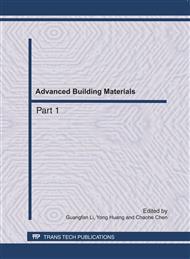p.943
p.947
p.951
p.956
p.962
p.969
p.974
p.980
p.984
Properties of Fly Ash Based Geopolymer Concrete Exposed to Sustained Elevated Temperatures
Abstract:
Fly ash based geopolymer concrete is gaining importance in the context of developing alternatives to cement concrete. The research work available in the literature shows many beneficial effects of the material in terms of its high early compressive strength, tensile strength, reduced shrinkage, good acid resistance etc., However, there are very few studies carried out on the influence of sustained elevated temperature on the properties of geopolymer concrete. This paper presents the results of some of the properties of fly ash based geopolymer concrete activated using sodium silicate and sodium hydroxide and subjected to elevated temperature at 150°C, 200°C, 300°C, 400ºc under sustained durations of 1 hour, 2 hours and 4 hours. The results show that residual compressive strength is about 20% less than the normal at about 200°C itself possibly due to the development of vapour pressure formed by the non-reactive water present in the system. Beyond 2 hours of sustenance, there is not much of a difference in the properties of concrete.
Info:
Periodical:
Pages:
962-968
Citation:
Online since:
May 2011
Authors:
Price:
Сopyright:
© 2011 Trans Tech Publications Ltd. All Rights Reserved
Share:
Citation:


